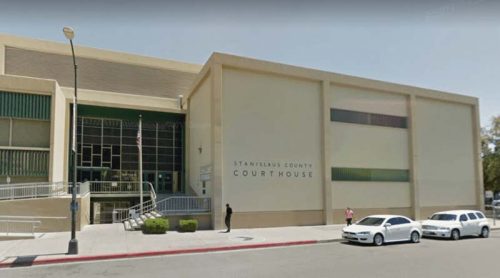

By Rena Abdusalam
MODESTO, CA – Judge Dawna Reeves, despite pleas for a reduction, rejected a man’s motion for resentencing here this week in Stanislaus Superior Court. The man, who represented himself, maintained his sentence of 27 years and 4 months is unjust.
At the age of 26, the accused and another individual robbed a woman who arrived home after grocery shopping. The accused was charged with robbery in the first degree, carjacking, a gun enhancement, possession of a firearm, and felony evading. In addition, the man also had a prior strike and an additional five-year enhancement.
During the accused’s argument this week, he raised multiple points about Proposition 47, which grants the petition of qualifying felony convictions to misdemeanor changes.
“I was eligible for Prop. 47 at the original sentencing. I never got that granted to me,” he said. “It should’ve been looked at by the court to see if it qualified for a Prop, 47 eligible crime. And I didn’t get that benefit.”
The accused also noted that although he was a juvenile defendant at the time of his prior strike, he was tried as an adult, adding, “Under Prop 47, it should’ve been seen if it stood as a direct file case too. I would ask the court to look into that.”
The accused also put forward his arguments regarding the gun enhancement, claiming the victim of the robbery described the assailant holding the gun as someone with no facial hair. He swore his booking picture showed he had facial hair that day.
“There were also intervening factors as well. She (victim) described a Toyota Highlander car as six feet tall, six feet wide, which would’ve obstructed her view into the garage at the time,” he notes. “Who’s to say how many people were in the garage at the time?”
However, Judge Reeves responded that the victim testified that there were two people in the garage during the crime and both had firearms.
“The evidence at the trial did not suggest there was a third person,” the judge asserted.
The accused also questioned the sufficiency of fingerprint evidence, noting the method used for the fingerprint evidence had no verification, making the evidence insufficient proof of identity.
After the accused finished his argument, Deputy District Attorney Sara Sousa responded, “A lot of [what] [the accused] states really should’ve been contained in a motion for a new trial if they were such egregious facts in this case that he felt that the convictions found by the jury should not be upheld.”
“[It] is my understanding that [the accused] was represented by competent council throughout the course of his trial,” the DDA continued, adding there was an in-court verification done by the victim (and) sufficient evidence that the accused was seen at the scene of the crime.
DDA Sousa also noted that due to an age change in Prop, 47, the accused would not be eligible for the qualifications even at the age of 17. Regarding the gun enhancement, the prosecutor said testimony states the accused was seen to have a firearm in his possession during the time of his offense.
Ultimately, Judge Reeves re-sentenced the accused to the same term of 27 years and four months with no eligibility of probation. After announcing her decision, the accused began to pack up his belongings.
The judge then listed the following considerations and factors: the accused’s participation in in-custody programs, letters of support from his family, information provided by the past public defender’s brief, the accused’s age at the time of the crime, and the individual characteristics of his criminal history and current charges.
“I do not believe a lesser sentence is warranted on these facts given (the accused’s) criminal history,” she continued.
Judge Reeves also factored in the nature of the crime, saying that according to the victim’s testimony, it seemed violent and caused bodily harm to the woman. During the judge’s recount of the violent crime, specifically stating evidence that showed it could’ve been pre-planned, the accused was shaking his head and raising his eyebrows.
“Additional aggravating factors that the defendant has engaged in violent conduct indicates a serious danger to society,” the judge added. “I’ve also considered the objectives in sentencing and find the important goals for this sentence are the protection of the community by isolating the defendant for a period of time and achieving uniformity in sentencing.”
“You’re going to do what you’re going to do. Let’s go. I’ll see you in a year,” the accused said.




